Dark Souls II
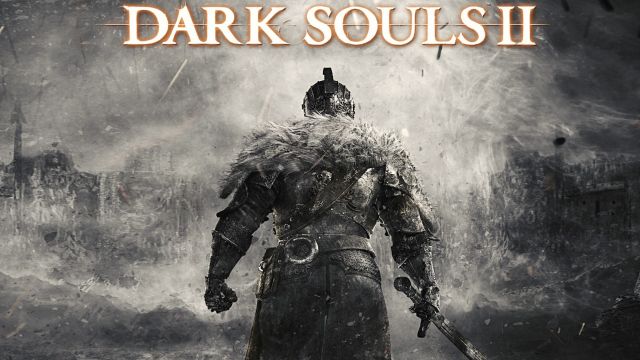
I’m a lover of psychology. Whenever I approach a curiosity, my first questions involve introspection (“What does this mean to me? Why am I feeling what I am? Does that make any sense, and if so, why?”) and extrospection (“What is the originator’s motivation or message? How and why do people react to this?”). The Dark Souls series is an extremely curious phenomenon in gaming and I would venture to say that if games are art, and one of art’s functions is to elicit emotions and strong opinions, then Dark Souls is a masterpiece. I doubt anyone has played it and not come away with an extreme reaction, and despite the diatribe I’m about to dispense, I credit Dark Souls 2 for at least not being milquetoast. And since there are dozens of reviews for it posted already which you can read for the standard rundown, I’m going to take a more psychological bent with my piece – who will enjoy Dark Souls 2, who won’t, and why?
I reviewed the original Dark Souls when it came out and I gave it an accurate score, based on how lousy of a port it is. The problem with that review is that I was fighting two battles – I was arguing that the execution of the game was horrendous (and it was – the controls were flat out broken, the graphics engine was insultingly lifeless and low-res on PC, etc.) and simultaneously, I was contending that the design was also poor. But along comes Dark Souls 2 and I feel like I’ve been given a second chance, an opportunity to finally delve deeply into the core of the design free of other distractions.
Why just the design? Well, because the porting of Dark Souls 2 is pretty damn good. The game runs smooth as hell, the controls do what they were designed to do, mouse and keyboard work great, I experienced not one crash, and the graphics are even noticeably more colorful and interesting (light rays peeking around trees and into dark caverns is extremely pretty). I have only the smallest of complaints, such the strange way that the mouse must be keymapped (you can only pick from pre-determined buttons, rather than entering your own, something they let you do just fine with keyboard commands). And what’s with the Xbox UI prompts everywhere, despite the fact that I don’t have one plugged in? Finally, the hit-box on your character is way too large, resulting in enemies taking huge whiffing swings at you that clearly miss by a good amount, but still damage you, often fatally.
But in the grand scheme, compared to the first Dark Souls, this is a damn good PC game. If it weren’t for those gamepad prompts, it might be hard to tell at first glance that it’s even a port. So let’s just get this out of the way: I’m giving the game an 85% because it fixes almost all of the technical problems I had with the last game and while I have some extreme complaints about the core of the game’s design, anyone who loved the Dark Souls will love Dark Souls 2 as well. It accomplishes everything it sets out to do.
Finally we get to the meat of this piece. I’ll say right now that if you love the Dark Souls series, stop reading right now. You got your decent score and the knowledge that the porting process went smoothly. Proceeding beyond this point requires you to pass through a fog door and what awaits you on the other side is only going to anger/frustrate/irritate you, just like that boss that you’re stuck on. But unlike the game, there will be no retrieval run to repair your hurt feelings.
Dark Souls 2 has all of the same design problems that plagued its predecessor. This is a game of memorization, repetition, backtracking, wasted time and meaningless victories. But all of my opinions rest on the answer to a single question: What is the point of a game? It’s a deeper question that it appears to be at first glance. Most people would say that the point of a game is to have fun. Of course, what “fun” means is entirely subjective but there are two main schools of thought when defining the purpose of a game. Either it’s an experience (i.e. it’s the journey, the moment-to-moment of playing) or it’s an achievement (i.e. it’s the end goal, the emotional, or actual, treasure box sitting behind that nasty boss).
Now of course, most everyone falls somewhere on a spectrum between those two poles. Everyone likes to be rewarded after doing something above-and-beyond in a game but everyone also likes to enjoy getting to that reward as well. The trick is to figure out where on that spectrum you fall and there is no better game than Dark Souls 2 to illuminate your position.
The general flow of the Dark Souls series is that you will explore your Myst-like dead (and undead) world of Drangleic, searching for small bits of treasure. You’ll encounter enemies along the way that range from fairly easy (though never that easy) to monstrously hard. You’ll die, a lot, and every time you die, you get exactly one chance to reclaim the souls you lost (which both level you up and serve as currency). If you die before reclamation, too bad. And when you finally get to a boss, you will die even more frequently until you memorize every attack animation and every way of evading said attacks. Finally, with your heart beating like you just ran a marathon, you’ll grind your way through, thankful that you’ll never have to do that again (at least until your next playthrough, if you’re a masochist).
So let’s dissect that flow briefly. The experience gamer, like myself, can find a decent amount of fun in the exploration and normal enemy fighting. Indeed, once you get over the fact that this RPG has no plot, very little dialogue and…basically no actual role playing, the ambiance of Drangleic is quite appealing, in its minimalism and gloom. But then you die. And here’s where experience players divide with achievement players. Experiencers immediately say to themselves, “What? You mean all of that time I just spent collection souls could potentially go down the toilet?” And if they fail in reclaiming their souls, it transitions to, “Okay, it’s official, I just lost 2 hours of my life.”
On the other hand, while the achievers also feel the sting of losing their souls, their first instinct is to turn all of it into a competition, first with themselves and then with other players. They think something along the lines of, “I’m not good enough yet. I need to get better so that next time, I don’t lose those souls.” The thought of wasted time doesn’t phase them (if they even consider it at all) and in fact, that virtual slap in the face encourages, rather than discourages, them to keep playing. Suddenly, they’ve got something to prove. That gauntlet has been thrown down, and they’ll be damned if they don’t take up the challenge.
This divergence of mindsets is even further exacerbated by boss fights. And let’s be clear here – developer From Software knows exactly how to market their games. When they create these bosses, design them to be nigh-impossible to kill without extensive and very specific self-training, they are counting on that competitive instinct in the achievers to not only buy the game and grind through it, but to then wear their “achievement” with pride, serving as the world’s best word-of-mouth advertising. After all, what’s the first reaction when someone on a forum exclaims how they don’t like the game? “Well, you must just suck at it!” The implication in that statement is clear as day: The game is only fun when you win; if you aren’t having fun, then you must not be winning.
Back to the experiencers, they simply want to enjoy their time playing the game. Sadly, there’s not much to enjoy. Let’s assume for a moment that someone was incapable of feeling that release of endorphins that comes from conquering an obstacle. How would you sell Dark Souls 2 to them? I honestly can’t picture that marketing campaign. So much rides on that singular emotion, that if you strip it away (or as in my case, if the full context of how meaningless an in-game achievement is, is ever-present in your mind), that’s it, the appeal immediately evaporates. Every death is met with a heavy sigh, a glance at the clock, and a thought of, “I wonder what else I could be doing right now.”
What I find stupefying and humorous is that when you ask an achiever why they like Dark Souls, they usually mention how difficult it is, how it punishes you for the slightest misstep, how you need to really spend time and learn everything about it before you get anywhere, and then they usually end with the obligatory bit of bragging that they beat it and eventually became the ultimate badass. When they hear about people rage-quitting, they laugh feeling the pleasant tingle of schadenfreude. But look at that for a moment. As a gamer, you’re going to pay $50 for the privilege of being punished? You’re going to sacrifice valuable time on this earth to endure repetitious backtracking and progression-blocking bosses that, while you’re playing, simply aren’t fun? What this tells me is that at the slot machine of life, those flashing lights and alarm sounds proclaiming that you hit the jackpot mean more to you, literally, than life itself.
Ultimately, no matter how strong of an adrenaline spike you get, no matter how pleasant the afterglow of a defeated boss, objectively nothing has been accomplished. Games are simply developer-created hoops that we pay to jump through. In the case of Dark Souls 2, it’s not exactly fun to do the jumping, but rather “rewarding”. What are you rewarded with? An emotion, a rush. The same rush that evolution has wired us to associate with real life accomplishment. But this isn’t real life, just a simulation of one. And thus, people keep coming back for more of that simulated rush.
Having fun while you play is an emotion too, but the difference is that it doesn’t require sacrifice. I can pick up Assassin’s Creed, play for an hour, just screwing around not accomplishing anything, or, conversely, plow through a few main story missions, turn it off and think to myself, “That was fun.” If I booted up Dark Souls 2 for an hour, tried to kill a certain boss but failed to do so, I would quit and think, “That sucked”. I never want to walk away from playing a game thinking that the time spent felt like unpaid intern work. Life is too short for that kind of self-flagellation.
Reviewed By: Brian Mardiney
Publisher: Bandai Namco
Rating: 85%
——————————————————————————–
This review is based on a digital copy of Dark Souls II for the PC provided by Bandai Namco.
 Game Over Online
Game Over Online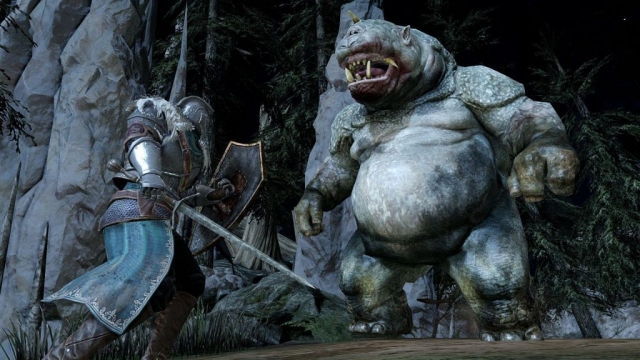
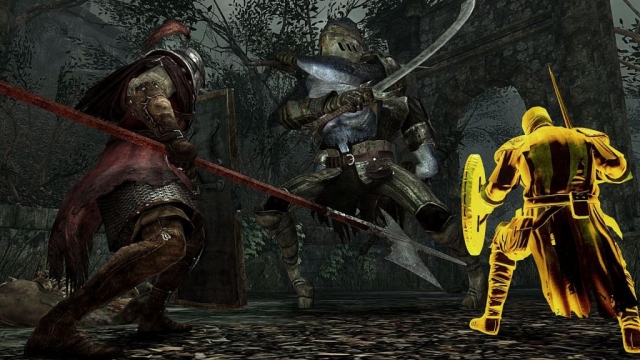
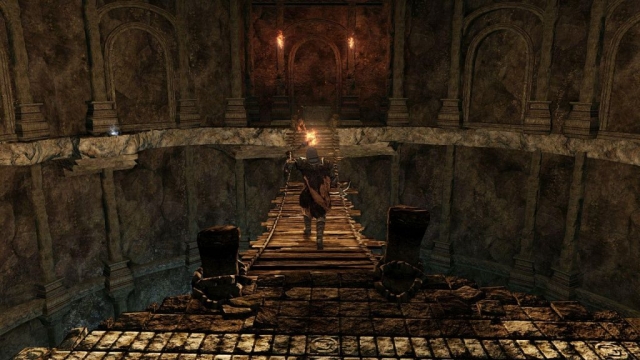
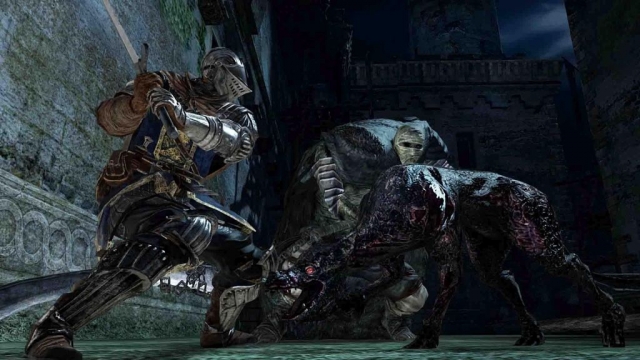
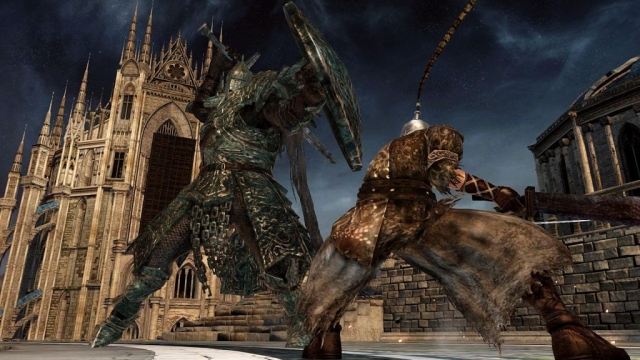




















Nice write up.
If I booted up Dark Souls 2 for an hour, tried to kill a certain boss but failed to do so, I would quit and think, “That sucked”. I never want to walk away from playing a game thinking that the time spent felt like unpaid intern work. Life is too short for that kind of self-flagellation.
Now let’s switch playing DS2 with writing this article…